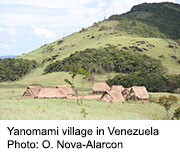- Could Your Grocery Store Meat Be Causing Recurring UTIs?
- Are You Making This Expensive Thermostat Error This Winter?
- Recognizing the Signs of Hypothyroidism
- 10 Strategies to Overcome Insomnia
- Could Artificial Sweeteners Be Aging the Brain Faster?
- Techniques for Soothing Your Nervous System
- Does the Water in Your House Smell Funny? Here’s Why
- Can a Daily Dose of Apple Cider Vinegar Actually Aid Weight Loss?
- 6 Health Beverages That Can Actually Spike Your Blood Sugar
- Treatment Options for Social Anxiety Disorder
Remote Amazon Tribe Members Have Greater Germ Diversity in Their Bodies


In a discovery that could eventually shed light on some diseases that plague modern society, a tribe in a remote part of the Amazon jungle in Venezuela appears to have the most diverse collection of bodily bacteria ever found.
The study suggests that modern living has decreased the diversity of the typical Westerner’s “microbiome” — the trillions of bacteria and other microbes that normally dwell in the body.
And that could be having wide-ranging consequences for people’s health, researchers say.
In particular, there is growing evidence that a less-diverse microbiome may contribute to disorders related to the immune system and metabolism, said Maria Gloria Dominguez-Bello, the senior researcher on the study and an associate professor of medicine at NYU Langone Medical Center, in New York City.
Those conditions include obesity, asthma, and autoimmune diseases such as type 1 diabetes — where the immune system mistakenly attacks the body’s own tissue.
One recent study, for example, focused on young children at high genetic risk of type 1 diabetes. Researchers found that the children typically showed a drop in the diversity of the gut microbiome about one year before they developed diabetes.
The new study, published April 17 in the journal Science Advances, offers a view of what the human microbiome looks like if it is untouched by modern, “Western” living, Dominguez-Bello said.
To get that snapshot, the researchers studied bacterial samples from an isolated tribe of Yanomami Indians living in southern Venezuela. Their village was originally spotted by helicopter in 2008, then visited by Venezuelan health workers.
Dominguez-Bello said the tribe had no known contact with non-Yanomami people. They speak their own language, and largely subsist on fish, plantains and cassava — a plant with a starchy root that the villagers sometimes drink as a fermented beverage, Dominguez-Bello said.
It turned out that the typical Yanomami microbiome had nearly twice the diversity of the typical American’s microbiome.
It was also more diverse than those of two rural groups — one from Venezuela and one from the African nation of Malawi.
According to Dominguez-Bello, the findings suggest that, with every step toward modernization, there is a decline in the body’s microbial diversity.
“Basically, our microbiome may be missing some members that our ancestors had,” said Lita Proctor, program director for the Human Microbiome Project at the U.S. National Institutes of Health.
And that’s concerning, according to Proctor, who was not involved in the new research.
Scientists are still trying to understand the critical roles that bacteria and other germs play in the human body. But, Proctor said, the microbes’ jobs include regulating immune function, digesting food, and helping to produce vitamins, anti-inflammatory compounds and even neurotransmitters — chemicals that relay messages among brain cells.
Why are Americans’ microbiomes lacking in diversity?
Much of that decline may come early in life, Dominguez-Bello said.
C-sections and lack of breast-feeding are thought to be two factors. C-sections deprive newborns of beneficial bacteria from the birth canal — and breast milk, Proctor said, “is nature’s way of feeding (gut) bacteria.”
Overuse of antibiotics, in medicine and agriculture, is another major contributor — as is the Western diet, Proctor said. Processed foods are, in essence, partially digested, whereas whole foods make the digestive system work, she said.
And do the Yanomami benefit from their greater bacterial diversity?
Because the tribe is so isolated, little is known about their rates of various diseases, Proctor acknowledged.
Unsurprisingly, they’re not overweight, Dominguez-Bello said. They do not seem to be malnourished, she noted, though they are “very short.”
The exact jobs of those additional members of the Yanomami microbiome are mostly unclear. However, a few of the bugs have been shown to offer benefits, according to Jose Clemente, another researcher on the project.
Clemente explained that one bacterium common among the Yanomami is known to protect against kidney stones. That bug is “nearly absent” in the other groups studied, said Clemente, an assistant professor at the Mount Sinai Icahn School of Medicine, in New York City.
In addition to the greater diversity, the Yanomami microbiome harbored a big surprise: genes that are resistant to man-made antibiotics — even though the tribe has never been exposed to the drugs.
“It’s a surprise and a mystery,” Proctor said.
According to the researchers, the findings imply that antibiotic resistance is a “natural feature” of the human microbiome — one that’s awakened by repeated antibiotic use.
For now, no one knows how to define a “healthy microbiome,” Proctor said. It likely varies among different populations, she noted, though probably not to a dramatic degree.
What’s “promising,” Proctor said, is that the microbiome makeup can be altered — and that could offer a way to improve public health.
For people who want to take steps now, she suggested cutting out processed foods and choosing whole ones.
“We already know they’re better for your health,” Proctor said.
More information
The American Academy of Microbiology has an overview of the human microbiome.
Source: HealthDay
Copyright © 2026 HealthDay. All rights reserved.










